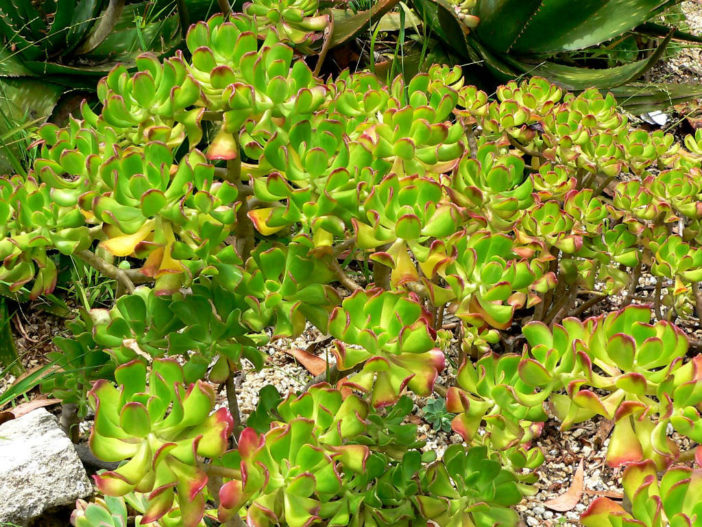Scientific Name
Sedum dendroideum Moc. & Sessé ex DC.
Common Name(s)
Bush Sedum, False Hens and Chickens, Tree Stonecrop, Tree Sedum
Synonym(s)
Sedum dendroideum subsp. dendroideum
Scientific Classification
Family: Crassulaceae
Subfamily: Sempervivoideae
Tribe: Sedeae
Genus: Sedum
Origin
Sedum dendroideum is native to Mexico (Chiapas, Oaxaca, Veracruz, Puebla, Tlaxcala, Hidalgo, Mexico, and Michoacan).
Description
Sedum dendroideum is a small succulent shrub with shiny green spoon-shaped leaves that cluster at the tips of the branches. It grows up to 3 feet (90 cm) tall and up to 4 feet (1.2 m) wide. Leaves have a line of subepidermal glands along the margins that can be red in summer. They are up to 1.6 inches (2.8 cm) long.
The large clusters of small star-shaped vivid yellow flowers appear above the foliage in late winter and early spring.
This species is often confused with Sedum praealtum, which has no such glands, and leaves tend to be more yellow-green.

Hardiness
USDA hardiness zones 9a to 11b: from 20 °F (−6.7 °C) to 50 °F (+10 °C).
How to Grow and Care
When growing Sedums, keep in mind that these plants need very little attention or care. They will thrive in conditions many other plants thrive in but do just as well in less hospitable areas. They are ideal for that part of your yard that gets too much sun or too little water to grow anything else. A common name for Sedum is Stonecrop because many gardeners joke that only stones need less care and live longer.
Sedum is easily planted. For shorter varieties, simply laying the plant on the ground where you want it to grow is usually enough to get the plant started there. They will send out roots from wherever the stem touches the ground and root itself. If you want to ensure that the plant will start there, you can add a very thin soil covering.
You can break off one of the stems for taller varieties and push it into the ground where you want to grow it. The stem will root very easily, and a new plant will be established in a season or two.
Learn more at How to Grow and Care for Sedum.
Links
- Back to genus Sedum
- Succupedia: Browse succulents by Scientific Name, Common Name, Genus, Family, USDA Hardiness Zone, Origin, or cacti by Genus
Photo Gallery
Click on a photo to see a larger version.



